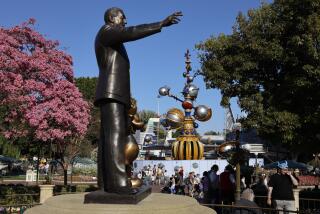Search for CSU Chief to Be Done in Secrecy
The California State University Board of Trustees, determined to lure a top-flight candidate to become the system’s new chancellor--and preferably one with business acumen--decided Monday to conduct the search to replace Barry Munitz in absolute secrecy.
No longer will the search committee make public the names of three finalists, as it has in the past. No longer will interviews with candidates be conducted in Cal State facilities. Even the most mundane logistical details--such as travel arrangements for contenders--will be handled by a professional search firm, not by Cal State staff.
“From the minute this meeting is closed today, it will be completely confidential up until we announce who the new chancellor will be,” board Chairwoman Martha Fallgatter told trustees at a special meeting at Cal State headquarters in Long Beach. She said she had appointed an eight-member search committee--smaller than usual--to reduce the chance of word leaking out.
Munitz, who has headed the 22-campus, 336,000-student university for six years, announced last month that he will become president and chief executive officer of the J. Paul Getty Trust in January. Cal State trustees hope to name his successor by November.
Officials said the move to restrict the flow of information to the public was a response, in part, to what happened this spring during the search for a new president of Cal State San Bernardino. Working in private, a selection committee narrowed the field to six candidates, but those names were leaked to the press.
One of the strongest contenders, Indiana University at Kokomo Chancellor Emita Hill, was so angry about the breach in confidentiality that she took her name out of the running.
In abandoning the practice of making public the names of multiple finalists, Cal State joins a growing group of universities--including the University of California--whose leaders argue that secrecy is an essential part of the wooing process for educational leaders. To be identified as a finalist who didn’t ultimately get the job, the argument goes, can be damaging to an administrator’s career and thus discourage top people from applying in the first place.
But state Sen. Tom Hayden (D-Los Angeles) said the new approach deprives the public of the opportunity to scrutinize potential leaders before they are hired. He noted that Munitz--the person trustees adore so much that there was talk Monday of cloning him--was chosen in a more public process.
“The man they’re holding up as having done more for CSU than any leader in public memory went through a bruising public process . . . and it didn’t prevent the right selection. So what’s broken here?” Hayden asked.
He contrasted Cal State’s new secrecy to the relatively open search for Los Angeles’ next police chief, in which the announcement of three finalists “inspired public confidence in the Police Department. Here [at CSU], it’s more of, ‘We know what’s good for you.’ In an institution like the CSU, that kind of medicine does not always go down very well.”
The trustees also committed themselves Monday to raising the new chancellor’s salary. Munitz makes $197,232 annually. But Fallgatter said his successor’s salary will be competitive with those of other college leaders. She cited the president of UC, who earns $253,300, as an example of the ballpark Cal State ought to be in.
Monday’s meeting also revealed more about what, exactly, the trustees are looking for in a new leader. Several board members mentioned the importance of the next chancellor having business experience, as Munitz did. For the nine years before he came to Cal State, Munitz was a senior executive at Maxxam, a Houston-based holding company.
“The element of business experience is more than just a plus,” trustee Anthony Vitti said. “I think it’s a necessary ingredient. We’ve seen how it’s helped this system over the past six years.”
That sentiment was accompanied by a reduced emphasis on academic credentials. Trustees approved a new set of criteria for selection of the chancellor that was largely the same as that used in 1990, when Munitz was chosen, with one notable difference: One criterion listed last time--”Significant academic accomplishments of the character to command professional respect of the academic community . . . and experience sufficient for the rank of full professor”--was omitted.
Instead, the next chancellor should have a “commitment to the values of an academic community,” according to the new list.
Munitz said that change was made when a staff member updated the criteria to reflect a more “realistic” vision of the chancellor’s job.
“This job isn’t first and foremost about scholarship,” Munitz said. “It’s a leadership job at an academic institution.”
More to Read
Sign up for Essential California
The most important California stories and recommendations in your inbox every morning.
You may occasionally receive promotional content from the Los Angeles Times.










